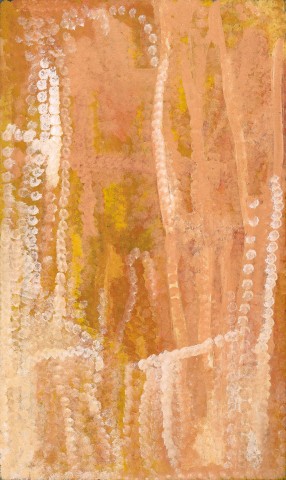ALALGURA LANDSCAPE II, 1994
EMILY KAME KNGWARREYE
synthetic polymer paint on linen
150.0 x 91.0 cm
bears inscription verso: artist's name and Delmore Gallery cat. 94A047
Delmore Gallery, Alice Springs, Northern Territory
The Holt Collection, Alice Springs, Northern Territory
Private collection, Melbourne
Emily Kame Kngwarreye: Werke Australischer Privatsammlungen, Kunsthaus Zug, Zug, Switzerland, 1 October 2019 – 12 January 2020
Isaacs, J., Smith, T., Ryan, J., Holt, D., and Holt, J., Emily Kngwarreye Paintings, Craftsman House, Sydney, 1998, pl. 44, pp. 114 - 115 (illus.), 197
This work is accompanied by a certificate of authenticity from Delmore Gallery that states:
‘Painted in mid-summer of 1994, “Alalgura Landscape II” is a direct reference to Emily Kngwarreye’s vast encompassing grasslands lying patiently “dry-harnessed” in the hope that summer will bring rain. She has captured the tonal colour of hayed-out water catchments, whilst ceremonies are in process accompanied by an over-arching serious need for rain to replenish all life forms. Here we see broad-brushed lines that float amongst dried flower heads and fragile grass remnants on bare soil, creating a wishful meditative expression of hope.
Sourced from her strong instinctive and measured awareness of the condition of food sources at such times, whilst drawing on past ceremonial body-painting memories, being permanently in tune with, and part of country, Emily is responding to the dry season as she paints her country on this special canvas.
This work was held in the Delmore Collection because it presented with bold spared body vertical lines within the work, thus referencing her later step into exceptional lineal works of vigour, abandon, and playful monotonal and coloured abstraction in 1995 and 1996. It is a work in which Emily has avoided her frequent use of various red and yellow colours, and painting with a more transparent and light-handed touch at the time – the dry season must have been influencing her.'
